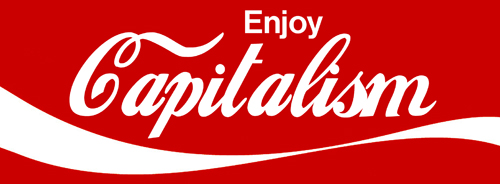
Definitions are important. Without correctly defining what the problems are, we can’t offer a workable solution. This is so obvious and yet despite enormous effort, there is no consensus on what kind of economic system we have right now.
Do we have a capitalist system, the bane of the left for as long as there has been a left? They would argue that capitalism in its purest forms descends inevitably into monopoly, despotism, and eventually wealth inequality. They say our current system is just capitalism doing what it always does. No mystery about it. Or are we in a form of socialism, like the libertarians would argue? They would say that pooling resources and risk inevitably leads to abuse from centralized power and the same kind of tyranny. Maybe we’re way past those definitions and our current system is merely a form of corporatism where corporations have ultimate power; then again, maybe it’s fascism and the government shares power with its partners in private industry. Maybe it’s all of these things or perhaps none of them. The point is, our definitions define the arguments and the solutions for ideologically inclined individuals.
In the 1970s, industrial capitalism faced ever increasing pressure from increasing energy costs and increasingly firm limits on consumption. As a result, controlling interest concentrated on generating wealth in the form of “financial capitalism,” which by its nature, produces nothing and is parasitic. Through this financial trickery, gains have been transfered to the financial capitalist increasingly at the expense of industrial capitalism.
The temptation exist among many, especially libertarians and what you might call “true believers in competitive capitalism,” to find some way to restore honesty to the system by eliminating this financial fraud. Even if we accept there ever was such a thing, there are two problems with this. First, the parasite will never surrender power which would lead to its own destruction. One anonymous poster puts it this way:
“Finance and industrial capital are constantly in a state of tension: finance needs industry to speculate on, but every dollar that finance earns they take directly out of the pockets of industry, so whenever finance grows, industry shrinks, and if industry is to grow then, as mentioned, finance would have to shrink… You can’t have both, and since financiers run the world, they certainly aren’t going to vote themselves out so as to give industry breathing room. It simply doesn’t make organic sense for a class to vote itself out of existence and power.”
Second, and more importantly, The whole reason financial capitalism found a foothold was because industrial capitalism wasn’t working using the old mathematical inputs. The writer continues:
“The reason we’re in this whole crisis is because industrial capital became stagnant and unable to realize profits commensurate with their investments back in the 70s, which created the conditions necessary for the ascendancy of finance capitalism. The idea of ‘Returning To The Good Old Days’ is as such anti-historical nonsense, barring a tremendous war (World War 2) which could consume 4/5ths of the worlds industrial base happening again. Basically, shit is fucked forever.”
Indeed. Our conclusion: What we have now is looking less and less like capitalism, that much is clear and the idea of returning to it is an impossibility given the ineffectiveness of technological advancement and the hard limits of our resources. Unfortunately (or fortunately depending on your perspective), new industrial fuel for capitalism like colonies in space doesn’t look like it will arrive in time to save the world from this kind of upheaval. Whether the end of capitalism is desirable or not is irrelevant. Its dying a very quick death. This is often lost on the pro-growth, pro-capitalism advocates.
We could have a fairly lengthy and academic discussion about what socialism is and what elements of our society qualify, from the welfare state, to our tax system, to government controlled industry, but few informed people would argue these things are actually working in favor of the working poor, even though they are advertised that way. So while pooled risk in Obamacare for example, may technically be socialistic, it certainly is not the type of socialism advocated by true socialists of the 19th century. Most of them are still “pro-growth” and have only recently tried to promote a no-growth economic model. Traditionally, they have just wanted to seize the system for themselves, not challenge its underlying premise. Further, this traditional form of socialism has virtually no voice on the global stage and is not in ascendancy.
That leaves us with fascism and corporatism. The victor, big government or big business, is not yet certain (though big-business is getting more powerful all the time). It probably doesn’t matter which you think will really pull it out in the end. Ultimately, neither group will cease trying to amass power until, in an Orwellian system of total control, they can claim the title of God.
Great. Something to look forward to.

